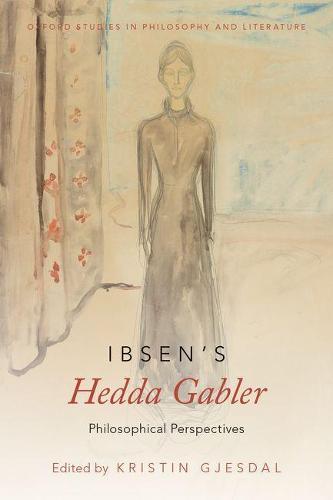Overview
Since its publication in 1890, Ibsen's Hedda Gabler has been a recurring point of fascination for readers, theater audiences, and artists alike. Newly married, yet utterly bored, the character of Hedda Gabler evokes reflection on beauty, love, passion, death, nihilism, identity, and a host of other topics of an existential nature. It is no surprise that Ibsen's work has gained the attention of philosophically-minded readers from Nietzsche, Lou Andreas-Salomé, and Freud, to Adorno, Cavell, and beyond. Once staged at avant-garde theaters in Paris, London, and Berlin, Ibsen is now a global phenomenon. The enigmatic character of Hedda Gabler remains intriguing to ever-new generations of actors, audiences, and readers. Hedda Gabler occupies a privileged place in the history of European drama and as a work of literature, and, as this volume demonstrates, invites profound and worthwhile philosophical questions. Through ten newly commissioned chapters, written by leading voices in the fields of drama studies, European philosophy, Scandinavian studies, and comparative literature, this volume brings out the philosophical resonances of Hedda Gabler in particular and Ibsen's drama more broadly.
Full Product Details
Author: Kristin Gjesdal (Associate Professor, Associate Professor, Temple University)
Publisher: Oxford University Press Inc
Imprint: Oxford University Press Inc
Dimensions:
Width: 20.80cm
, Height: 2.30cm
, Length: 14.50cm
Weight: 0.476kg
ISBN: 9780190467876
ISBN 10: 0190467878
Pages: 274
Publication Date: 01 February 2018
Audience:
Professional and scholarly
,
Professional & Vocational
Format: Hardback
Publisher's Status: Active
Availability: Manufactured on demand

We will order this item for you from a manufactured on demand supplier.
Reviews
A wide-ranging volume that presents a series of diverse philosophical openings * from Plato, to Nietzsche, Kierkegaard, Adorno, Wittgenstein, and Butler *
A wide-ranging volume that presents a series of diverse philosophical openings--from Plato, to Nietzsche, Kierkegaard, Adorno, Wittgenstein, and Butler--onto what is one of the most engaging, challenging, and disorienting plays in the modern canon. All students of Ibsen's great play will find their reading enlightened, deepened, and troubled by these thoughtful and thought-provoking essays. --Jay Bernstein, Distinguished Professor of Philosophy, The New School Hedda Gabbler is a fascinating character and a powerful embodiment of modernity; and in collecting an impressive set of essays that tackle a wide range of philosophical questions provoked and addressed by this play, Kristin Gjesdal has performed a great service both for lovers of Ibsen and for anyone concerned with modernism and feminism. --Jonathan Culler, Cornell University
The breadth and variety of these chapters... make it a worthwhile addition to the library of any scholar of modern theatre and its intersections with philosophy. -- Benjamin Bigelow, University of Minnesota, Modern Language Review A wide-ranging volume that presents a series of diverse philosophical openings--from Plato, to Nietzsche, Kierkegaard, Adorno, Wittgenstein, and Butler--onto what is one of the most engaging, challenging, and disorienting plays in the modern canon. All students of Ibsen's great play will find their reading enlightened, deepened, and troubled by these thoughtful and thought-provoking essays. --Jay Bernstein, Distinguished Professor of Philosophy, The New School Hedda Gabbler is a fascinating character and a powerful embodiment of modernity; and in collecting an impressive set of essays that tackle a wide range of philosophical questions provoked and addressed by this play, Kristin Gjesdal has performed a great service both for lovers of Ibsen and for anyone concerned with modernism and feminism. --Jonathan Culler, Cornell University
Author Information
Kristin Gjesdal is Associate Professor of Philosophy at Temple University and Professor II of Philosophy at the University of Oslo. She is the author of Gadamer and The Legacy of German Idealism (CUP, 2009), Herder's Hermeneutics: History, Poetry, Enlightenment (CUP, 2017), and a number of articles in the areas of aesthetics, hermeneutics, and nineteenth-century philosophy. Kristin Gjesdal also works in philosophy of literature, with a special emphasis on Shakespeare and Ibsen. She is the editor of Key Debates in Nineteenth Century European Philosophy (Routledge, 2016), the coeditor of The Oxford Handbook of German Philosophy in the Nineteenth Century (OUP, 2015) and the forthcoming Cambridge Companion to Hermeneutics, and an area editor of nineteenth-century philosophy for The Stanford Encyclopedia of Philosophy.




